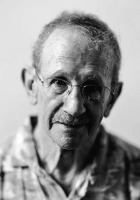Call It Music Poem by Philip Levine
Call It Music
Some days I catch a rhythm, almost a song
in my own breath. I'm alone here
in Brooklyn Heights, late morning, the sky
above the St. George Hotel clear, clear
for New York, that is. The radio playing
"Bird Flight," Parker in his California
tragic voice fifty years ago, his faltering
"Lover Man" just before he crashed into chaos.
I would guess that outside the recording studio
in Burbank the sun was high above the jacarandas,
it was late March, the worst of yesterday's rain
had come and gone, the sky washed blue. Bird
could have seen for miles if he'd looked, but what
he saw was so foreign he clenched his eyes,
shook his head, and barked like a dog--just once--
and then Howard McGhee took his arm and assured him
he'd be OK. I know this because Howard told me
years later that he thought Bird could
lie down in the hotel room they shared, sleep
for an hour or more, and waken as himself.
The perfect sunlight angles into my little room
above Willow Street. I listen to my breath
come and go and try to catch its curious taste,
part milk, part iron, part blood, as it passes
from me into the world. This is not me,
this is automatic, this entering and exiting,
my body's essential occupation without which
I am a thing. The whole process has a name,
a word I don't know, an elegant word not
in English or Yiddish or Spanish, a word
that means nothing to me. Howard truly believed
what he said that day when he steered
Parker into a cab and drove the silent miles
beside him while the bright world
unfurled around them: filling stations, stands
of fruits and vegetables, a kiosk selling trinkets
from Mexico and the Philippines. It was all
so actual and Western, it was a new creation
coming into being, like the music of Charlie Parker
someone later called "glad," though that day
I would have said silent, "the silent music
of Charlie Parker." Howard said nothing.
He paid the driver and helped Bird up two flights
to their room, got his boots off, and went out
to let him sleep as the afternoon entered
the history of darkness. I'm not judging
Howard, he did better than I could have
now or then. Then I was 19, working
on the loading docks at Railway Express
coming day by day into the damaged body
of a man while I sang into the filthy air
the Yiddish drinking songs my Zadie taught me
before his breath failed. Now Howard is gone,
eleven long years gone, the sweet voice silenced.
"The subtle bridge between Eldridge and Navarro,"
they later wrote, all that rising passion
a footnote to others. I remember in '85
walking the halls of Cass Tech, the high school
where he taught after his performing days,
when suddenly he took my left hand in his
two hands to tell me it all worked out
for the best. Maybe he'd gotten religion,
maybe he knew how little time was left,
maybe that day he was just worn down
by my questions about Parker. To him Bird
was truly Charlie Parker, a man, a silent note
going out forever on the breath of genius
which now I hear soaring above my own breath
as this bright morning fades into afternoon.
Music, I'll call it music. It's what we need
as the sun staggers behind the low gray clouds
blowing relentlessly in from that nameless ocean,
the calm and endless one I've still to cross.
From Mexico and the Philipoines.... Thanks for posting....
wow! this is a cool poem, one that makes me want to read more levine. it helps that i share some of his background. but mainly i'm impressed with the weighty human concerns that come through this combination of narrative and meditation. it has a strong ending with the sun staggers and the resonant archetypal image crossing the ocean as a metaphor for passing from this life. gk
In this kind of poem you wait for the appearance of the title in the poem's body. In this it doesn't appear until the fourth to the last line. And is it ever worth the wait! ! This is a poem in which the present moment of remembering merges with the memories of the past, and words like regret, loss, second-guessing, second thoughts, oh, so many words, but they simply don't apply here. That is the singular achievement of Philip Levine's poem: it is not given to us as a memory poem fixed in the past, it is not praise-poem about the long dead, although some will read it as one or both of those. And that's perfectly fine. Anything anyone does with this poem is perfectly fine. But pay attention for once: THIS IS A POEM ABOUT ORPHEUS (OK, Orpheus-redux, if you must) . It is about the orphic power of both words and sounds, of poems and jazz compositions, about poetry and music. It's also about doing what you will in time before death pops in, and says casually because he is inevitable, OK, folks, it's over right now. Wrap it up. And I'm thinking, He forgot to say, It's finished and it's good. We can all be proud of ourselves. Someone else will pick up the pieces we leave behind. We have a journey to take, and remember don't drink the water of the first fountain we pass. He forgot to say those things, so I'm saying them. Because I reject his casual inevitabilities. I'm for the orphic power of music and poetry.

What a lengthy read but i can say it was really worth it.bravo! ! !